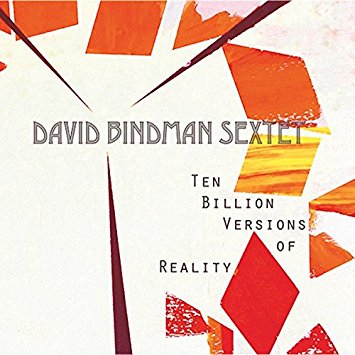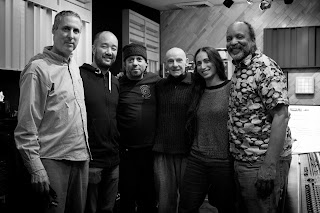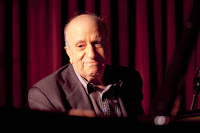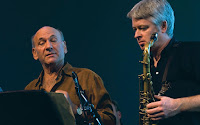 |
| Photo: David Garten |
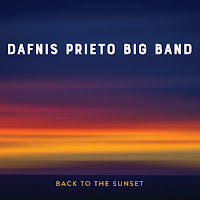 2018 sees the release of "Back To The Sunset", the debut of the Dafnis Prieto Big Band. The 17-member ensemble roars, rollicks, rumbas, and purrs its way through nine original piece, each one dedicated to two or three of the drummer's mentors and/or employers. Three of those mentor/employers - Henry Threadgill, Steve Coleman, and Brian Lynch - are guests. In fact, the program opens with "Una Vez Más" dedicated to Tito Puente, the afore-mentioned Palmieri, and trumpeter Lynch, who appears as a soloist. One of the first things one notices listening to this music is the seductive rhythms created by the leader, percussionist Roberto Quintero, pianist Manuel Valera, and bassist Ricky Rodríguez. Once the melody is stated by Lynch, the various sections create fascinating backgrounds, counterpoint, and more. The pianist gets the first solo, a dancing excursion which starts and stays with only his partners "on the bottom" for support. Then Lynch steps in with a crackling yet melodic solo. Quintero and Prieto burn through a call-and-response with the brass and reeds before the whole band restates the opening theme (dig the brass trills in the foreground).
2018 sees the release of "Back To The Sunset", the debut of the Dafnis Prieto Big Band. The 17-member ensemble roars, rollicks, rumbas, and purrs its way through nine original piece, each one dedicated to two or three of the drummer's mentors and/or employers. Three of those mentor/employers - Henry Threadgill, Steve Coleman, and Brian Lynch - are guests. In fact, the program opens with "Una Vez Más" dedicated to Tito Puente, the afore-mentioned Palmieri, and trumpeter Lynch, who appears as a soloist. One of the first things one notices listening to this music is the seductive rhythms created by the leader, percussionist Roberto Quintero, pianist Manuel Valera, and bassist Ricky Rodríguez. Once the melody is stated by Lynch, the various sections create fascinating backgrounds, counterpoint, and more. The pianist gets the first solo, a dancing excursion which starts and stays with only his partners "on the bottom" for support. Then Lynch steps in with a crackling yet melodic solo. Quintero and Prieto burn through a call-and-response with the brass and reeds before the whole band restates the opening theme (dig the brass trills in the foreground).  |
| Photo: David Garten |
 |
| Photo: David Garten |
The program closes with "The Triumphant Journey", a driving, pulsating, tune dedicated to Dizzy Gillespie and the great Cuban percussionist Chano Pozo (first brought to this country by Mario Bauzá). The section writing and musicianship is splendid as are the solos from trumpeter Mike Rodriguez, trombonist Tim Albright, alto saxophonist Filiú, and the fiery blast before the close from tenor saxophonist Joel Frahm.
Music and, especially, rhythms from the Caribbean as well as from Central and South America has mesmerized the United States since the 19th Century. The joyful sounds created by the Dafnis Prieto Big Band may have its roots in the slave trade but here is a paean to freedom and creativity. "Back To The Sunset" is a treasure, sounds to delight in, to play really loud so the drums shake the walls and the rhythms inhabit your body. On top of that, there are memorable melodies and splendid arrangements. What a joy!
For more information, go to dafnisonmusic.com.
DAFNIS PRIETO BIG BAND
Mike Rodríguez, Trumpet, Flugelhorn
Nathan Eklund, Trumpet, Flugelhorn
Alex Sipiagin, Trumpet, Flugelhorn
Josh Deutsch, Trumpet, Flugelhorn
Román Filiú, Alto Sax, Soprano Sax, Flute, Clarinet
Michael Thomas, Alto Sax, Soprano Sax, Flute, Piccolo
Peter Apfelbaum, Tenor Sax, Soprano Sax, Melodica
Joel Frahm, Tenor Sax, Soprano Sax
Chris Cheek, Bari Sax
Tim Albright, Trombone
Alan Ferber, Trombone
Jacob Garchik, Trombone
Jeff Nelson, Bass Trombone
Manuel Valera, Piano
Ricky Rodríguez, Acoustic & Electric Bass
Roberto Quintero, Congas, Bongos, Percussion
Dafnis Prieto, Drums & Music Director
Special Guests:
Brian Lynch, Trumpet (Track 1)
Henry Threadgill, Alto Sax (Track 4)
Steve Coleman, Alto Sax (Track 6)
Counting the two albums John Hollenbeck created with the Frankfurt Radio Big Band plus one each with Jazz Big Band Graz and Orchestre National de Jazz as well as the first two under the monicker of John Hollenbeck Large Ensemble (2005's "A Blessing" on Omnitone and 2009's "Eternal Interlude" on Sunnyside), "All Can Work" (New Amsterdam Records) is the drummer and composer's seventh adventure with a big group. Like the Dafnis Prieto album, Hollenbeck's recording is filled with tributes to musicians and mentors who have help to shape him into a unique voice in contemporary music. The new album, featuring 17 musicians, the fascinating voice of Theo Bleckmann, and conductor JC Sanford, offers five new works by the leader plus fascinating new arrangements of pieces from Billy Strayhorn, Kenny Wheeler, and electronic music pioneers Kraftwerk.
Wheeler's "Heyoke" (from his 1976 ECM "Gnu High" album that featured Keith Jarrett, Dave Holland, and Jack DeJohnette) was arranged for big band when Hollenbeck's Ensemble backed the composer and trumpeter at the 2011 Festival of New Trumpet Music (FONT). Wheeler, who produced a number of brilliant recordings for large ensembles, had only arranged the opening segment of the original 22-minute piece so Hollenbeck finished it for him. This brilliant tune, featuring fine solos from Matt Holman (trumpet), Matt Mitchell (piano), and Jacob Garchik (trombone) plus powerful wordless vocal from Bleckmann, ends before the final section with just piano and voice in tribute to the passing of Wheeler and his longtime collaborator, pianist John Taylor.
The title track is dedicated to the late trumpeter, educator, and mentor Laurie Frink (1951-2013) who worked with many large ensembles in the New York City area. Based on an exercise she wrote for her students and featuring lyrics taken from her texts with the composer, the swirling brass and reeds, the mesmerizing piano and vibraphone, and the short phrases from the various sections, all combine to take the listener on a fascinating sonic journey.
 |
| Photo: Ken Weiss (T Bleckmann edit) |
These words do not do justice to the brilliant writing and playing to be heard on "All Can Work". Although John Hollenbeck does not dedicate to a song to either Bob Brookmeyer (the album is dedicated to the late composer, arranger, and valve trombonist) or Meredith Monk, the engaged listener can hear their influences at times during this delight-filled program. When you really listen to the John Hollenbeck Large Ensemble, you will hear music of its time, music that point to continued innovation and new ways to combine the music of our world.
For more information, go to johnhollenbeck.com. Connecticut readers, take note that the JHLE will be appearing in Danbury on April 28 as part of the Western Connecticut State University 23rd Annual Jazz Fest. The previous evening (4/27), trumpeter Roy Hargrove joins the WCSU Jazz Orchestra, Jimmy Greene director. For more information about those shows, go to www.wcsu.edu/newsevents/events.asp. For just the Hollenbeck concert, tickets are available at www.eventbrite.com/e/23rd-annual-jazz-fest-featuring-the-john-hollenbeck-tickets-44268366877.
Here's the Strayhorn tune:
Personnel:
Ben Kono soprano/alto/tenor sax, flute
Jeremy Viner clarinet, tenor sax
Tony Malaby tenor/soprano sax on 3, 6
Dan Willis tenor sax, clarinet
Anna Webber flute, tenor sax on 1, 2, 4, 5, 7, 8
Bohdan Hilash clar/bass clarinet, bass sax, tubax
Mark Patterson trombone
Mike Christianson trombone
Jacob Garchik trombone, euphonium on 8
Alan Ferber trombone on 2, 3, 4, 5, 6
Jeff Nelson trombone on 1, 7, 8
Tony Kadleck trumpet, flugelhorn
Jon Owens trumpet, flugelhorn
Dave Ballou trumpet, flugelhorn
Matt Holman trumpet, flugelhorn
Chris Tordini acoustic, electric bass
Matt Mitchell piano, organ, keyboard
Patricia Brennan vibes, marimba, glockenspiel
John Hollenbeck drums, composition
Theo Bleckmann voice
JC Sanford conductor









